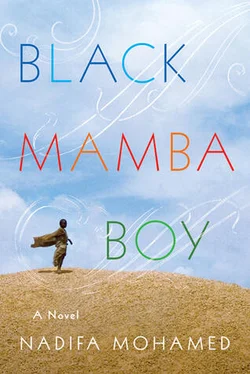Askaris marched past Jama with shifty glances in his direction as if he would spontaneously combust, but he had fought off death, and inside he was triumphant. His life took form around him again, his heart beating, warmth returning to his skin, and all around Italians bellowing commands and insults. He tried to imagine the expressions on Shidane’s and Abdi’s faces when he told them that he had miraculously survived while all the others had been turned into mincemeat.
He smoothed down his hair and approached an angry-looking Somali. “Uncle, where is this depot place?”
“Waryaa, look at the state of you, tolla’ay, what have they done to us? Fuck the depot, get away from here, I’m warning you to stay away from that hellhole. They killed one of us there last night, in cold blood, a young boy like you. Run now, if you know what’s good for you,” the man raged.
The uncle seemed crazy. He was wearing an army shirt with a ma’awis wrapped around his waist, and he kept clutching at his groin. Jama roamed all over town until he found the depot, calm, businesslike, and sated after the night’s bloodletting. Alessi, Tucci, and Fiorelli were the hardworking, baby-faced army mules that they seemed; they served Jama quickly and politely, even dropping a couple of out-of-date chocolates into his bag as a treat. Jama filled his flask over and over at the tap and then went into the daylight, ready to find Shidane and Abdi and show them the carnage at the cave.
Abdi was close by, crouched down by the perimeter fence. Jama raced up to him, trying to form the story in his mind. He knew that his mother had placed a shield of the coolest air between him and the rocket, but the boys would never believe him. He looked around, needing Shidane to hear the first telling of it, too, when it was still spicy and dramatic.
“Ascaro Abdi, you will never guess what happened to me. Look at me Abdi, look at me.” Jama pulled Abdi’s chin up so that he faced him.
Abdi was muttering and rocking on his heels, covered in dust, his jaw trembling. Jama saw a stain of rust-red blood on Abdi’s shirt. He tried to put an arm around Abdi and gather him closer but Abdi shot to his feet and started yelling. He picked up rocks and threw them with all his might at the compound, and a rock bounced off the tin roof before Jama dragged him away.
“Where’s Shidane? What’s happened, Abdi?”
“Come with me, Jama. You want to see, come with me,” shouted Abdi, and he abruptly began running, Jama chasing after him.
Abdi led him to a clearing beside the road, before stopping and turning toward Jama. It was the first time Jama could look into Abdi’s eyes, and they were chilling. Under the furrowed eyebrows they were wide and lost, behind them nothing, a bare ruin. His mind had been startled from its temple and had circled above before flying away. Jama took a step back, but Abdi grabbed his hand in a hard, clumsy grip and pulled him forward.
Abdi’s face was ripped open by a smile. “Look, there was nothing here when I buried him, and now this bush.” Abdi pointed at a huge sprawling shrub, its grasping leaves violently green and alive.
“Who did you bury here?”
“Shidane, of course. I buried him myself. Where were you, Jama? We could have saved him.”
Jama started to tremble and Abdi stared at him before pulling a disgusted face and turning back to the bush. “When I left, nothing, and now this.”
The bush frightened Jama, it seemed to grow in front of his eyes, and it shone independently of the fading light.
“Who killed him, Abdi? What happened?” said Jama numbly through his tears.
“Who do you think, idiot? The people I saw you with at the depot, they ate him and threw out what they didn’t want.”
They were in a valley, desolate, gravelly and full of craters, and for a moment Jama felt like they were standing on the face of the moon.
“Let’s go, Abdi, come with me, let’s go to Egypt. I have enough food on me, come, get up, let’s go, enough,” coaxed Jama in a panic. He felt cold and dead again.
“I would rather die than eat their food. I’m staying here with my blood, you can go where you like.”
Jama’s sobs became louder and louder but Abdi just snarled at him, “Leave me alone, take your stupid noise somewhere else.”
“I’m not leaving you,” cried Jama. “What happened? You just went on an errand, Abdi, what happened?”
In a monotone, Abdi told him about the rice, the shack, and the noises, and by the end Jama understood and could look into Abdi’s eyes without flinching. As evening fell, a large full moon sat imperially in the sky, glaring down at them, and as Jama collected firewood, Abdi picked up rocks and threw them at its white, pockmarked face. His feet kicked up fine dust as like a dancer he leaped up at the moon. Jama turned his back on him and got the fire blazing with a box of matches Shidane had given him. Afterward he held the box tight in his hand and prayed for Shidane’s soul. They both slept without eating, as if in sympathy with Shidane, who would never eat again, or boast about his cooking again, who was now a meal for worms. Jama wrapped Abdi in his new shirt and lay down, nearly on top of the fire, afraid that the chill inside him would freeze his heart. He could not sleep. Morbid thoughts ran through his mind; life was tenuous, there was no value to it, each day brought the threat of annihilation, or the loss of those you loved. He eventually fell into a sleeplike state, beside the smoldering heap of the burnt-out fire. At dawn, Jama woke as cold as death, his feet in the tight roots of the bush. As he paced around, waiting for Abdi to wake up, his feet gained feeling; they were like the hooves of a racing camel, like Guure’s feet, not happy unless they could feel miles of earth passing underneath them every day. Ambaro always said, “The only thing that comes to you if you sit around is death”; this was his family’s only philosophy. Jama felt an urgent need to empty his bowels, and walked away to relieve himself. From where he crouched, Abdi appeared consumed by the bush. Jama quickly finished and ran to wake him up.
“I told you I was staying here,” Abdi snapped. His eyes were still vacant, but now he hit and pinched himself, and muttered prayers under his breath, seeming embarrassed by Jama’s presence.
“You can’t stay here, they will throw us down the mountain as deserters. You can’t do anything for Shidane now, let’s go,” Jama begged.
“You go, I will catch up with you,” stuttered Abdi. Jama was keeping him from something and he was growing agitated. Jama looked around him, at the gray mountains echoing with the distant din of guns, the dusty road snaking away. He gave half of his food ration to Abdi, held his skinny body for an awkward embrace, and then walked away.
Jama took off his mutilated army shirt and marched away from Keren, jumping into bushes when he heard convoys approaching, chasing after traders who fled on their camels when they saw the half-naked mad boy pursuing them. At nightfall he stopped, lost and hungry. With his dwindling flour ration he made gloopy tasteless pancakes, threw them down his throat and ate sweet, yellow meke berries he had picked along the way. Unable to lie still, he started walking by moonlight as well. He had long left the straight slave-built road and now just followed the magnetic pull of the stars. As the sun came up he saw more evil, corpses crushed by British tanks rushing to victory, the dusty white tracks still visible on the black men. Jama broke into a cold sweat and struck out in a different direction. The straps of his sandals had broken, and the loose soles rubbed against his blistered feet. He sucked on stones to ease his parched throat. By a ravine he staggered to a stop and fell asleep, lullabied by the gurgling water. For a long time Jama heard whistling, but in the no-man’s-land between sleep and wakefulness, he ignored it. When the whistling turned into humming and laughing, he shot up. He scanned around: nobody, just scrub and silence. He lay down again, only for the whistling to start as his head touched the ground.
Читать дальше
Конец ознакомительного отрывка
Купить книгу












